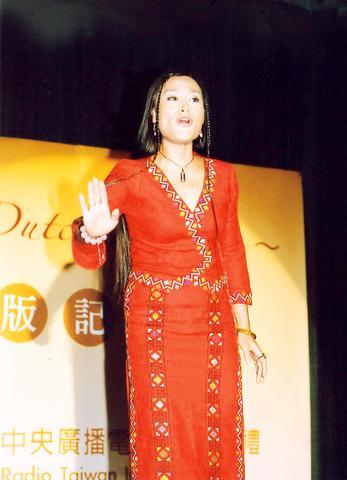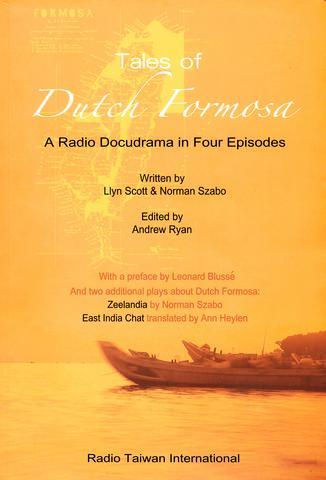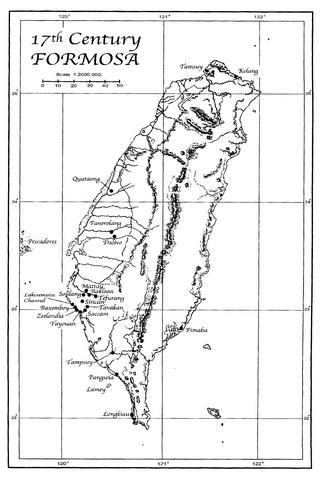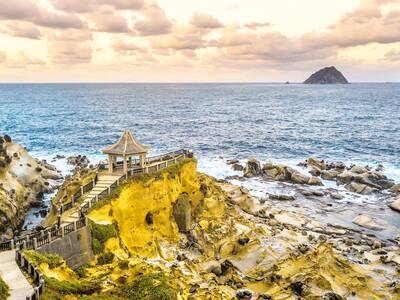In 1662, Zheng Cheng-gong (鄭成功), also known as Koxinga, (國姓爺) defeated the Dutch in Taiwan and ended 38 years of colonization in Taiwan. Three-hundred-and-forty-two years later, in 2002, during a World Cup Baseball match, when Taiwan was playing against the Netherlands, a group of local fans held up a portrait of Koxinga and shouted, "Go! Go! Taiwan!"
Koxinga's triumph is strongly emphasized in Taiwanese history books, so much so that the facts of 17th century Dutch rule have became an unknown past.

PHOTO COURTESY OF RADIO TAIWAN INTERNATIONAL
For example, few know that Anping Castle (安平古堡) in Tainan City was actually the southern face of the exterior wall of Fort Zeelandia, which the Dutch spent 20 years building. The special relations between Dutch missionaries and Taiwan Aboriginal groups are also little known.

Tales of Dutch Formosa, produced by Radio Taiwan International (中央廣播電台), is the first English-speaking radio drama about Taiwan's history and Aboriginal people, to deal with this period of Taiwan history.
The drama was first produced and broadcast on Aug. 16 two years ago. It was well-received and was broadcast again last year.

In the hope of further disseminating the history of Taiwan in the 17th century, the drama has become a language-teaching textbook. Radio Taiwan International made the script and radio drama into an album of four CDs and a book. The album was launched last Friday.
Tales of Dutch Formosa was written by Llyn Scott and Norman Szabo. Scott, a professor in the English Department at Fu Jen Catholic University, is also the director of the drama. Andrew Ryan, a radio program host took charge of the editing of the book, recording and sound engineering for the album.
"In Taiwan, it is rare to see a film or drama about its historical past. I hope the readers can see the radio drama as the gold pendant hung on the neck of Domingo Aguilar, the Spanish adventurer in Taiwan in the 17th century. We hope that the production of the program is like the lure of the gold pendant, attracting more people to come together and explore the undiscovered gold mine that is the history of Dutch Formosa," Llyn Scott said, at the launch of the book.
Tales of Dutch Formosa starts in 1624, when the Dutch East India Company set up a trading center in what is now the Tainan area. The story focuses on the interaction between Dutch governors, missionaries and Taiwanese Aboriginal people.
There are stories about the Dutch missionaries setting up schools and teaching Aborigines how to read and write using the Roman alphabet, as well as teaching them to recite prayers, the articles of faith and sing psalms.
There are also depictions of Aboriginal rituals, which were seen as uncivilized and evil in the eyes of the ministers. For example, one of the Aboriginal beliefs was that women should not give birth to a baby before the age of 35. Abortions were therefore common practice in the villages. The missionaries attempt to convince the villagers about the sinful nature of abortions.
There are, of course, scenes of battle, such as when Koxinga attacked the fort of Zeelandia. With fires burning the city, missionaries saw the Aborigines, their former students, helping the Chinese and fired on them.
Tsao Yung-ho (曹永和), a historian at Academia Sinica and an expert on Taiwan-Dutch relations during Dutch rule, praises Tales of Dutch Formosa. He said the new information helps reconstruct a new historical perspective on Taiwan's history.
"What we know about Taiwan history is mainly the history after the Qing Dynasty. We know little about the history before that [time]. That was a period when the Dutch beat the Spaniards and established their power in Taiwan. It was also a time of sea expeditions and the Protestants took over Taiwan after the Catholics," Tsao said at the press conference.
He said the Dutch built up different relations with the residents of Taiwan. With the Han people who had migrated from China, it was basically an economic partnership and the Chinese were made to pay taxes. "With the Aborigines, however, it was a deeper relationship. The Dutch were teachers, governors and moral instructors to the native villagers," Tsao said. "This was a special relationship between the Dutch and the Aborigines. This made the Aborigines more difficult to tame, even after Koxinga and the other Han rulers who came later to Taiwan," Tsao said.
Tales of Dutch Formosa is a radio drama full of music and sound effects. The album recruits famous Puyuma singer Samingad (紀曉君) to sing songs from Aboriginal ceremonies. The program also recruits 17 musicians who perform the background music.
For more information about purchasing the program, contact Radio Taiwan International. Tel: (02) 2885 6168 # 731 or go to www.cbs.org.tw.

The low voter turnout for the referendum on Aug. 23 shows that many Taiwanese are apathetic about nuclear energy, but there are long-term energy stakes involved that the public needs to grasp Taiwan faces an energy trilemma: soaring AI-driven demand, pressure to cut carbon and reliance on fragile fuel imports. But the nuclear referendum on Aug. 23 showed how little this registered with voters, many of whom neither see the long game nor grasp the stakes. Volunteer referendum worker Vivian Chen (陳薇安) put it bluntly: “I’ve seen many people asking what they’re voting for when they arrive to vote. They cast their vote without even doing any research.” Imagine Taiwanese voters invited to a poker table. The bet looked simple — yes or no — yet most never showed. More than two-thirds of those

In the run-up to the referendum on re-opening Pingtung County’s Ma-anshan Nuclear Power Plant last month, the media inundated us with explainers. A favorite factoid of the international media, endlessly recycled, was that Taiwan has no energy reserves for a blockade, thus necessitating re-opening the nuclear plants. As presented by the Chinese-language CommonWealth Magazine, it runs: “According to the US Department of Commerce International Trade Administration, 97.73 percent of Taiwan’s energy is imported, and estimates are that Taiwan has only 11 days of reserves available in the event of a blockade.” This factoid is not an outright lie — that

Former Chinese Nationalist Party (KMT) chairwoman Hung Hsiu-chu’s (洪秀柱) attendance at the Chinese Communist Party’s (CPP) “Chinese People’s War of Resistance Against Japanese Aggression and the World Anti-Fascist War” parade in Beijing is infuriating, embarrassing and insulting to nearly everyone in Taiwan, and Taiwan’s friends and allies. She is also ripping off bandages and pouring salt into old wounds. In the process she managed to tie both the KMT and the Democratic Progressive Party (DPP) into uncomfortable knots. The KMT continues to honor their heroic fighters, who defended China against the invading Japanese Empire, which inflicted unimaginable horrors on the

Sitting on a bus bound for Heping Island (和平島), at the start of my first visit to Keelung in years, I was hell-bent on visiting a place of considerable historical interest, even though I knew that it wasn’t officially open to the public. In 2011, archaeologists working in the densely populated southern half of the island unearthed the foundations of the Convento de Todos los Santos (Convent of All Saints, 諸聖教堂), a Catholic house of worship established during Spain’s 1624-1642 occupation of northern Taiwan. I’d heard about its rediscovery a while ago, but it wasn’t until I read a scholarly